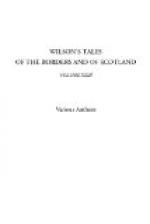Even when he went to bed they were fresh upon his ear, claiming precedence to the vision of his eye; though that, too, asserted its authority as something miraculous—whether the Eastern mystery itself, or some tutelary genius brought from heaven by the shriek of man’s cruelty. Nor could he rest for the thought that, humble as he was, he was surely taken there that he might go to the powers of earth to ask them to aid the powers of heaven. Why, that Cradle had been built within the limits of civilisation. Even the mason was known: the bricks were not Egyptian bricks, nor the mortar foreign, nor the wood a tree from the heart of Africa; and yet, why was it there—nay, why was the use of it not inquired into? If Jeshurun had waxed fat and kicked against the Lord of heaven, was there no lord of earth that could tame this yellow-livered worshipper of Baal, who yet was received among the chiefs of Israel to drink the pure juice of the grape, and make a god of his belly, and to sing obscene songs? Even in that house there was riot and debauchery upon the spoils of that woman, encaged like a beast, and at the world’s end from her natural protectors.
Yea, our good soul Aminadab became bold. He was privileged, if not called. But then that Brahma—that incarnation of a power confessed by millions on millions of people possessed of souls, and therefore something in God’s reckonings! It was no illusion. Twice he had seen the mysterious being. How did he come hither to the Ultima Thule, as it were, of the known world? Why did he come just at a juncture when the daughter of a king of his own favoured people was immured in a dungeon, and calling for his help? Because he must have known that a spark of the spirit that belonged to him, and would go back to him, was threatened to be extinguished by power in a land owing no obedience to him. But didn’t that same moon shine on the children of Brahma as well as on the children of Christ? and were there no powers in




